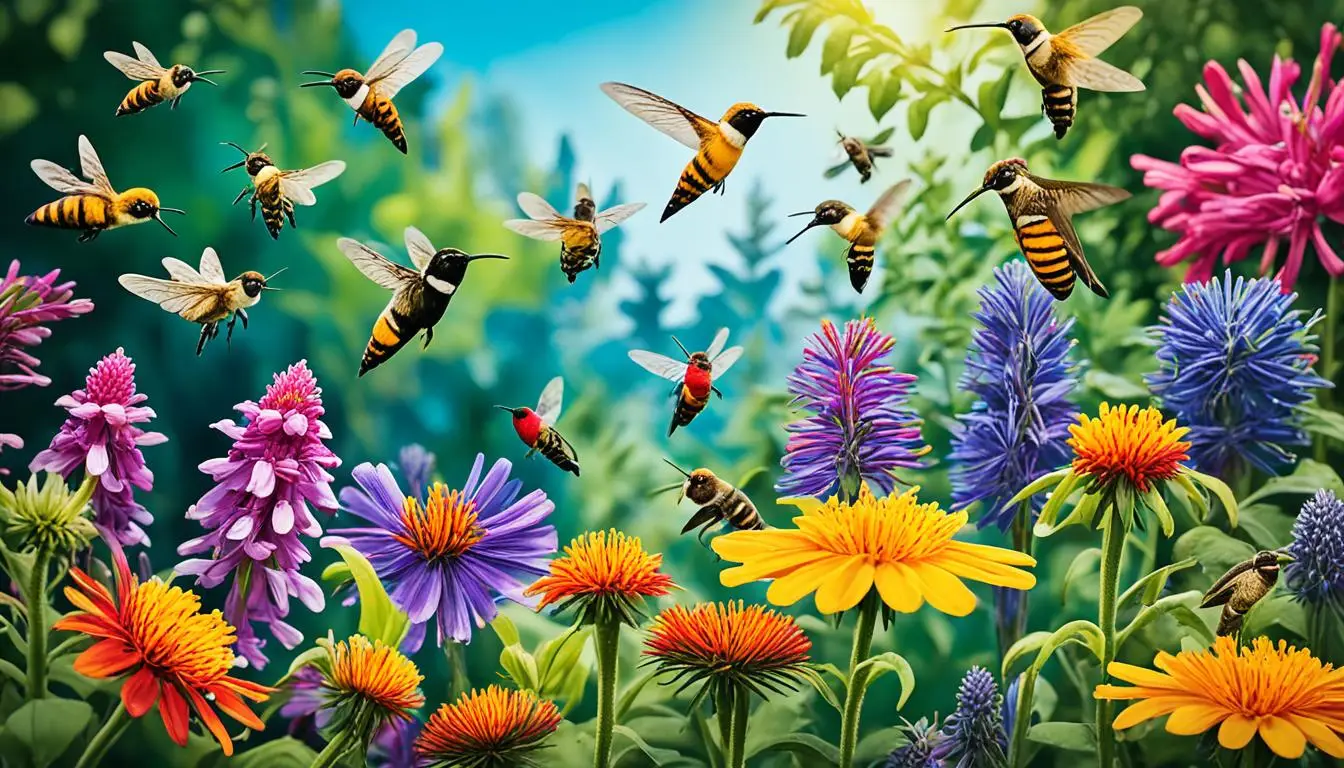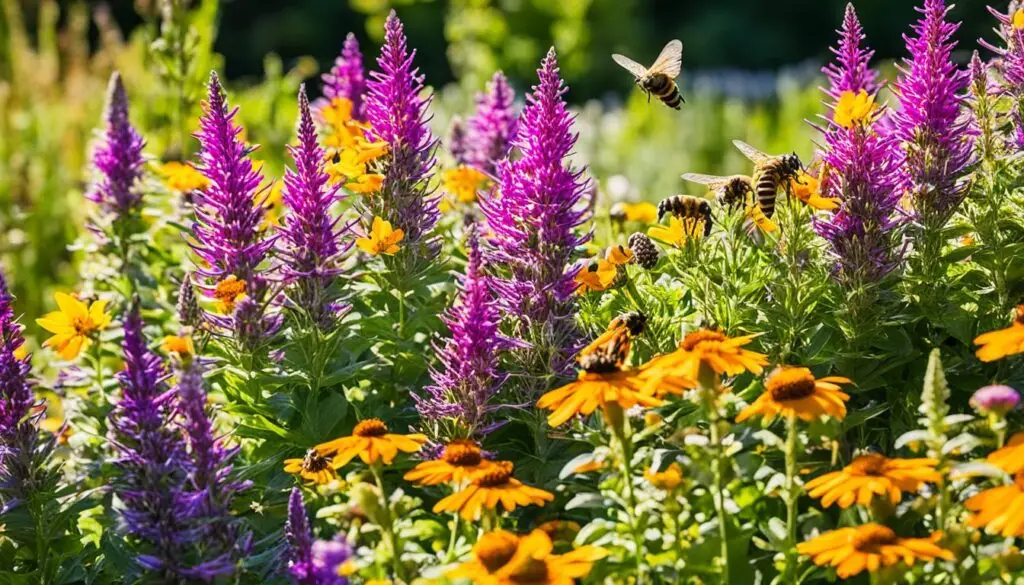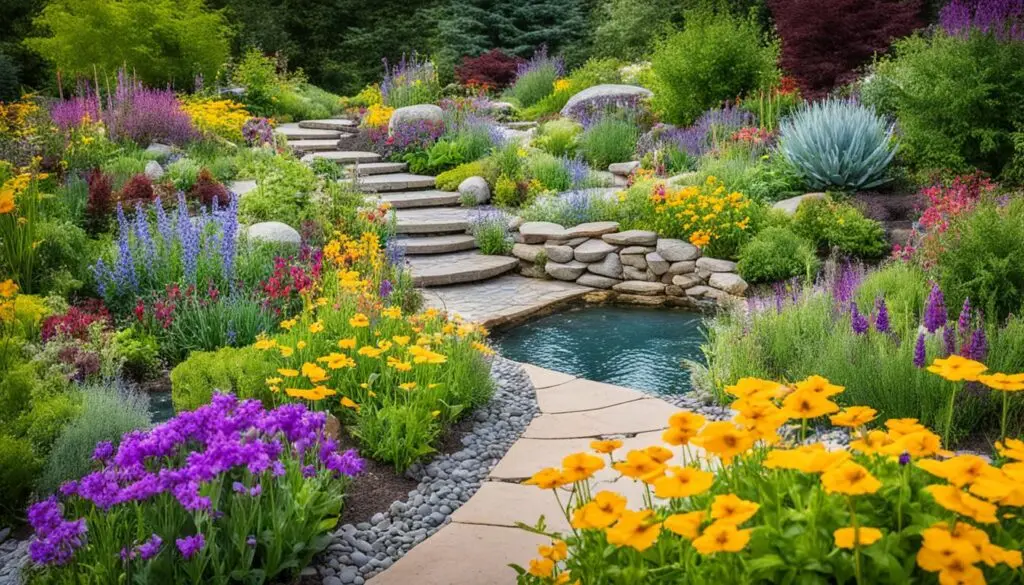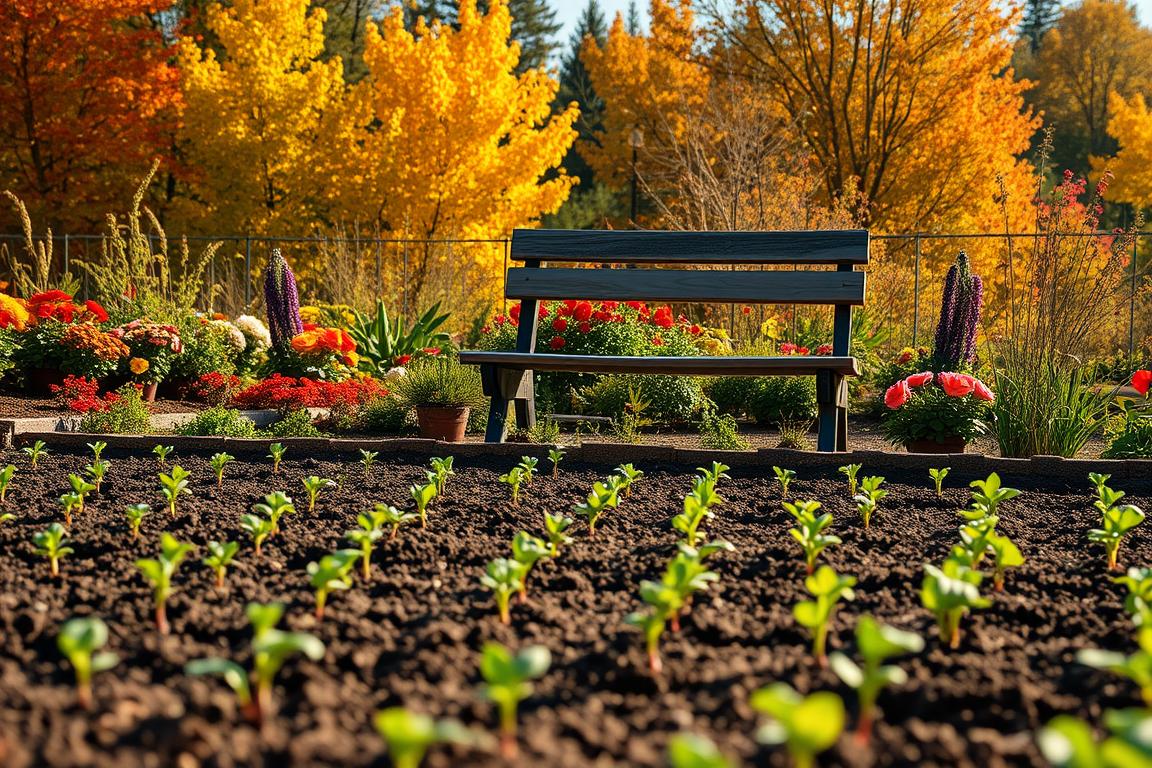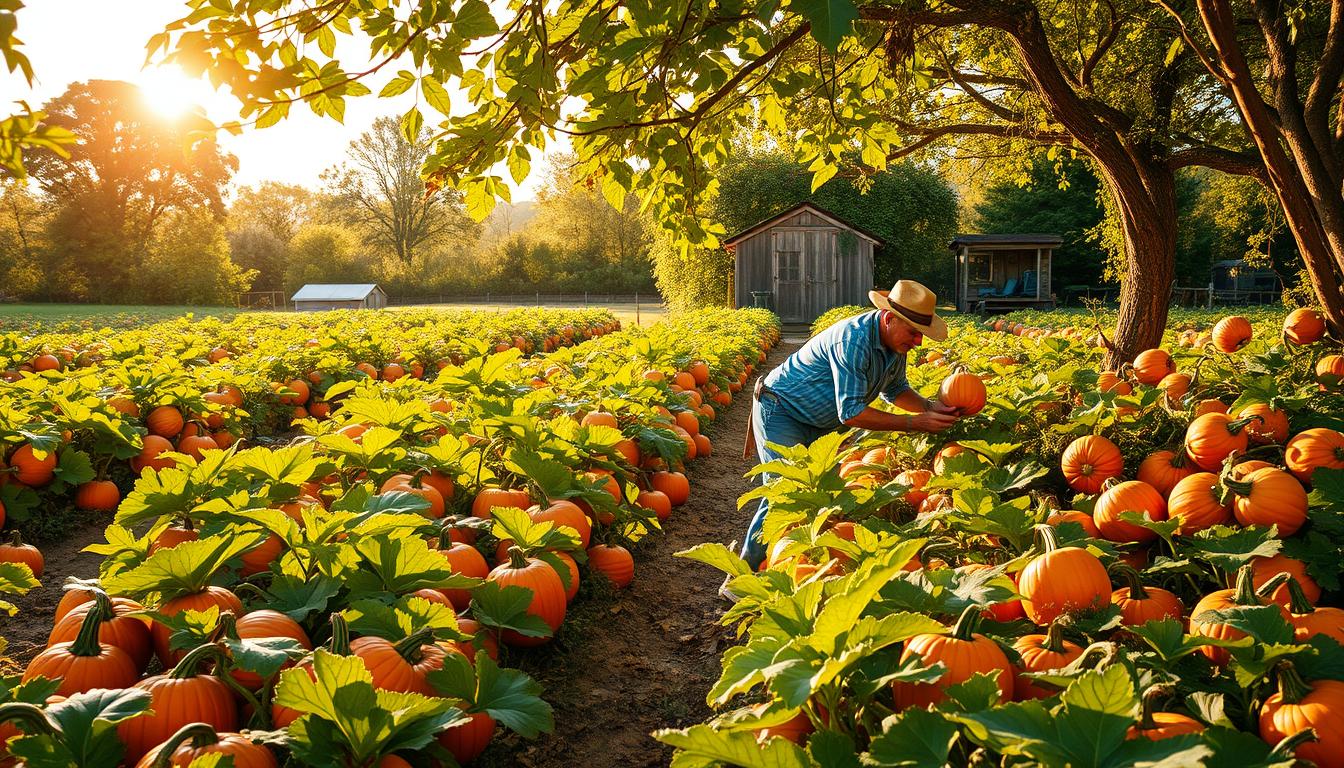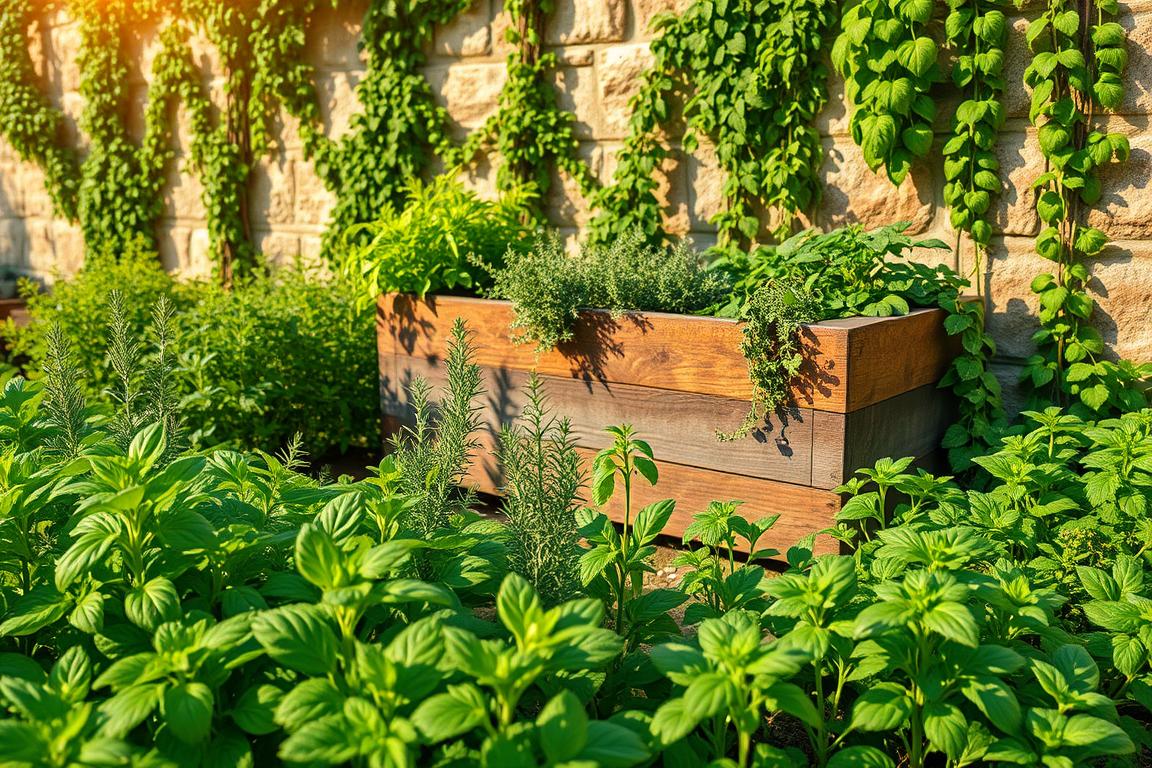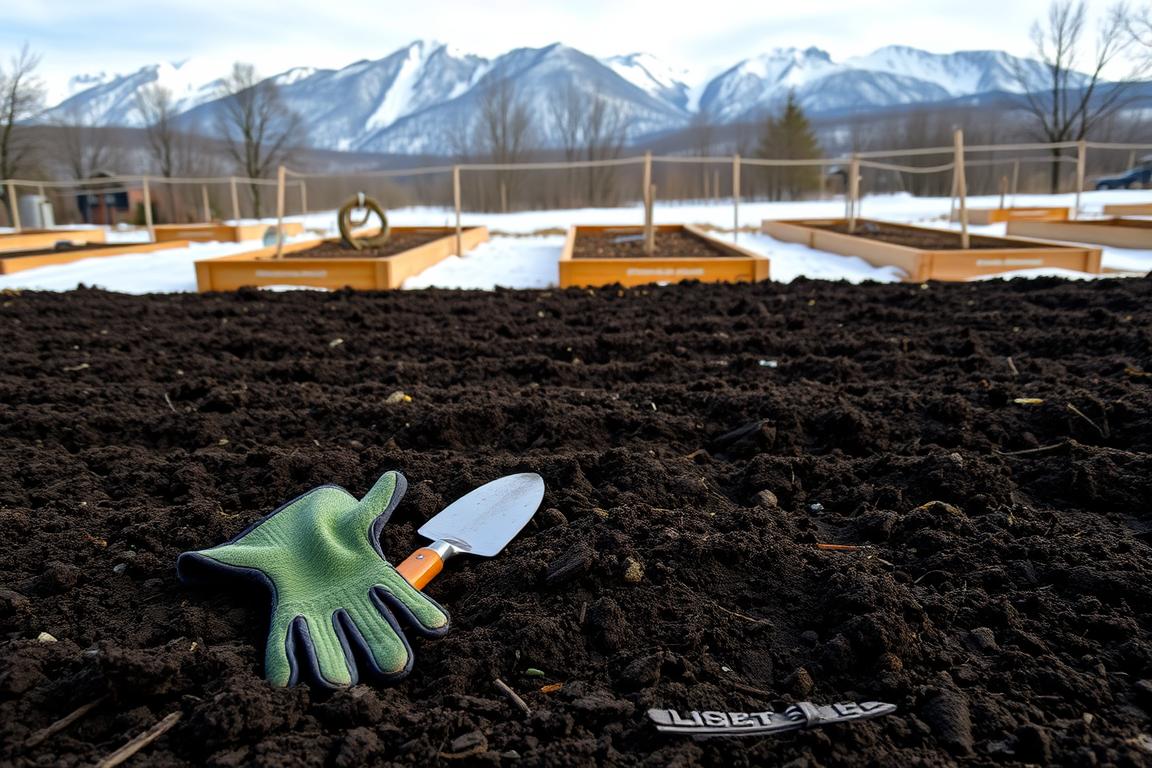Pollinators are crucial for the health of garden ecosystems. They include bees, butterflies, hummingbirds, and bats. These creatures help plants, including many fruits and vegetables, by spreading pollen. Without them, gardens would find it hard to survive and plant diversity would drop. This piece will delve into the importance of pollinators, the main species found in gardens, and how gardeners can support them by creating a pollinator-friendly environment.
Key Takeaways
- Pollinators are essential for the health and productivity of garden ecosystems.
- Bees, butterflies, hummingbirds, and bats are some of the most common garden pollinators.
- Pollinators help plants reproduce and increase their genetic diversity.
- By making a pollinator-friendly garden, you can get more crops and help your local environment.
- You can attract and help pollinators by planting the right flowers, giving them a place to nest, and not using harmful chemicals.
Understanding Pollinators and Their Importance
The key to a healthy garden is a variety of pollinators. They help countless plant types by carrying pollen. This leads to the growth of fruits, vegetables, and seeds that we and animals need to eat.
What Are Pollinators?
Pollinators move pollen from one plant to another, starting the fruit and seed growth. Bees, butterflies, moths, hummingbirds, bats, and certain small mammals and insects make up this group. They all have a part in a garden’s ecosystem, ensuring its vibrancy.
Why Are Pollinators Crucial for Gardens?
Pollinators are vital for gardens. They are key to many plants being able to produce fruits, veggies, and flowers. Without them, garden plants would struggle to complete their life cycle. This would cause the garden’s health and productivity to drop.
Common Pollinators in Your Garden
Bees and butterflies are well-known pollinators in gardens. They are essential for pollinating various plants, helping the ecosystem thrive.
Bees: Nature’s Busy Workers
Bees like honeybees, bumblebees, and solitary bees play a vital role. They visit flowers searching for nectar and pollen. These busy bees ensure our plants bear fruits, veggies, and seeds necessary for us and wildlife.
Butterflies: Graceful Aerial Pollinators
Butterflies are aerial pollinators and play an important role in gardens. Their long proboscises help them sip nectar from various flowers. As they move from flower to flower, they support plant reproduction, making gardens more productive and diverse.
| Pollinator Species | Pollination Characteristics | Preferred Habitats |
|---|---|---|
| Honeybees | Highly efficient, gather nectar and pollen for their colonies | Open, sunny areas with diverse flowering plants |
| Bumblebees | Strong, fuzzy pollinators that can access flowers with deep corollas | Diverse gardens, meadows, and natural areas |
| Monarch Butterflies | Graceful, long-distance migrants that pollinate a variety of plants | Areas with milkweed plants for larval development |
| Hummingbirds | Agile, nectar-feeding birds that pollinate tubular flowers | Gardens with a variety of nectar-rich plants |
“The Role of Pollinators in Your Garden Ecosystem”
Pollinators are key in garden ecosystems as they help plants reproduce. They pollinate many types of plants, allowing them to bear fruits, vegetables, and seeds. These are needed by both people and animals. Pollinators in garden ecosystems support a rich variety of plants. This, in turn, helps create a thriving home for birds, small animals, and helpful insects.
Pollinator importance is huge for healthy garden ecosystems. Recognizing the vital role of pollinators in garden ecosystems is crucial. By making our gardens welcoming to these creatures, we ensure our gardens flourish over time.
A lively garden biodiversity shows a balanced, pollinator-filled space. Gardeners focusing on pollinator needs and using plants that attract them will see more diverse and numerous pollinators. They will also enjoy a more productive, strong garden ecosystem.
Creating a Pollinator-Friendly Garden
To make a pollinator-friendly garden, choose many plants that attract pollinators. Select plants that bloom from spring to fall. This keeps a steady supply of nectar and pollen. It supports pollinator habitat and a healthy, organic gardening system.
Choosing Pollinator-Attractive Plants
When you pick plants, go for ones that bring in a lot of pollinators. Choose native flowers and herbs that have a lot of nectar and pollen. Mixing in different plants means food for bees, butterflies, and more all year.
Providing Nesting Sites and Water Sources
Having the right plants is great, but you can do more. Create spaces for bees to nest. This includes open ground and man-made spots. Also, make sure there’s water with shallow dishes and pebbles for safety.
Avoiding Pesticides and Chemicals
Avoiding pesticides and chemicals is crucial for a good garden. These can harm pollinators and upset their lives. Choose to garden organically. Use natural ways to control pests and weeds. This will help your pollinator habitat thrive, boosting your garden’s health and variety.
Benefits of a Pollinator-Rich Garden
Gardens with many pollinators produce more crops and have a diverse plant life. These helpers, like bees and butterflies, are crucial for growing many fruits and veggies. They also help ornamental plants to reproduce well. By doing so, they make sure gardens are full of tasty and beautiful plants.
Increased Crop Yield and Diversity
Having lots of different pollinators, from bees to hummingbirds, makes gardens flourish. These important creatures move pollen between plants. This allows fruits, veggies, and seeds to grow. It means gardeners get a bigger variety of produce and a more plentiful harvest.
Supporting Local Ecosystems
A garden full of pollinators helps both the gardener and the local ecosystem. It offers food and homes for many creatures, from helpful bugs to birds and small mammals. This leads to more biodiversity and a garden that is stronger and more balanced.
Conclusion
Pollinators, such as bees, butterflies, and hummingbirds, are key to healthy gardens. They help plants, including many fruits and vegetables, grow by pollinating them. Understanding the importance of pollinators is crucial. It allows gardeners to support their gardens for the long run.
To create a pollinator-friendly environment, gardeners should pick plants that attract pollinators. They should also offer them places to nest and water. It’s important to avoid using pesticides that could harm them. This approach helps the garden’s ecosystem flourish.
Recognizing the vital role of pollinators is more critical than ever. They’re essential for our gardens and the world at large. When we adopt pollinator-friendly practices, our gardens thrive. This benefits us and the many other life forms in and around our gardens.
FAQ
What are pollinators and why are they important for gardens?
Pollinators are animals that carry pollen from one plant to another. They help make new fruits and seeds by moving pollen around. This is crucial for gardens because it keeps many plant species growing and diverse.
Without pollinators, plants in gardens would struggle to make food like fruits and vegetables. This would make garden ecosystems less healthy and productive.
What are the common pollinators found in gardens?
Bees and butterflies are very important in garden pollination. Bees, including honeybees, bumblebees, and solitary bees, move from flower to flower. They are looking for nectar and pollen to feed their groups. Butterflies also help. They fly gracefully and use their long mouthparts to reach flower nectar.
How can gardeners create a pollinator-friendly environment?
Gardeners should pick many different plants that bloom at different times. This gives pollinators nectar and pollen all year. Gardeners should also offer homes for bees, like log piles, and make sure there’s clean water available. Using harmful chemicals should be avoided since they can hurt pollinators.
What are the benefits of having a pollinator-rich garden?
Gardens with many pollinators get more food and support a wide ecosystem. Pollinators are key in making us have lots of fruits and veggies. They do this by helping plants make seeds and fruits.
Also, pollinators attract other animals, like beneficial bugs and birds. This makes a garden more diverse and strong.


